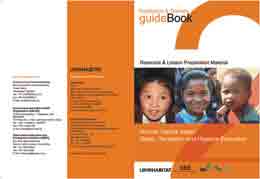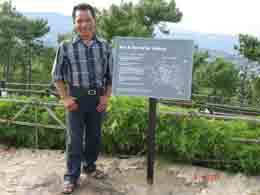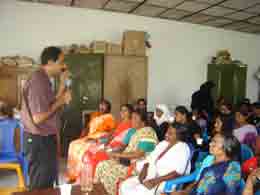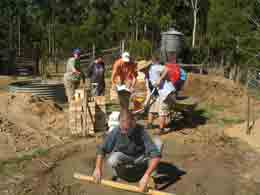WATSAN Activities
As a part of capacity building for Human Value Based Water, Sanitation and Hygiene Education (VBWSHE) in schools of the four project cities of Madhya Pradesh, a two-day workshop on “Rain Water Harvesting and VBWSHE was organized by UN-Habitat and Lake Conservation Authority of Madhya Pradesh at Bhopal on 1 - 2 September.
The first day of the workshop included a lecture on techniques of Rainwater harvesting, film screening, interactive activities and games on the theme of Water and Sanitation. More than 140 students participated from the different schools of Bhopal. On the second day, the workshop was conducted for teachers in which more than 50 teachers from different schools participated. The teachers were also oriented by Satish Awate, Programme Coordinator, CEE Central on how to use Guide Book-II in their schools and incorporate its activities in their regular curriculum.
 |
The education materials developed under the project were distribited. These include Facilitators & Trainers Guide Book-II on VBWSHE, Teachers Watsan Classroom activity manual, posters, and labels. |
|
|
Similar workshops are being organized in four cities of Madhya Pradesh, namely Gwalior, Jabalpur, Indore and Bhopal, in which the materials developed by CEE for WATSAN project are being disseminated. About 200 teachers and 500 students will participate.
|
|
 |
Interpreting Meghalaya’s Bounty
CEE Meghalaya recently completed the signages project supported by the Ministry of Tourism, GoI through the Directorate of Tourism, Govt. of Meghalaya Shillong. The project involved fabrication and installation of various signage components, both indoor and outdoor, to promote tourism in Meghalaya.
Meghalaya referred to as “Switzerland of the East” has unique natural sites/places of tourist attractions, including waterfalls, monoliths, sacred groves, caves, National Parks and Sanctuaries.
 |
A key objective of this project was to translate the technical language of natural sciences into interesting and understandable information for the average visitor. |
|
|
|
|
 |
Energy Education in Primary Teacher Training Colleges
Energy Education in Primary-teacher Training Colleges (PTC) is a joint initiative of the Gujarat Energy Development Agency and CEE. As a part of this initiative, workshops have been organized in 25 PTC colleges in 5 districts of Gujarat with the objective to orient the students to Energy Conservation and help them incorporate Energy Education into their lesson plans. The 25th workshop was conducted at M.B.Shah PTC, Kheda, Gujarat. Based on the learnings, there are plans to extend the programme in all the 457 PTC Colleges of Gujarat.
“The Workshop was very exciting and informative. Through the activities we got an opportunity to showcase our skills and also learnt about Energy and its conservation." (Patel Vinod, a student of 2nd Year)
|
|
 |
Capacity Building for Goat Rearing
CEE Kannur conducted training programmes on goat rearing for Kudumbasree (Women SHG) in Kerala. The Kudumbasree Mission has designated CEE Kannur as a training agency in the district. The training programme was funded by NABARD as part of their skill development initiatives under the scheme.
 |
5 training programmes of 4 days each were conducted in 5 panchayats. 375 women participated in the trainings. |
|
|
|
|
 |
Global Communities for Sustainability
Twelve schools in Australia and seventeen schools in India have registered for the Global Communities for Sustainability (GCS) Project.
(http://www.ceeaustralia.org/gcs/about.htm).
The Sustainable Development Initiative (SDI) teams have been formed and are working on various sustainability issues.
 |
The SDI team from Wondai School, Queensland working on regenerating a cattle paddock on their school grounds. |
|
|
|
|
|
 |
Climate Change
Communicating Climate Change
Rashmi Gangwar, Programme Coordinator, CEE HImalaya participated in an eight-day South Asian ‘Climate Change and Multimedia Communications Workshop’ in Kathmandu, Nepal. This workshop provided important learnings for documenting CEE’s disaster risk reduction and preparedness initiatives in the Himalayan region.
The workshop, organised by Panos South Asia, aimed to build the capacity of media and other communication practitioners on climate change issues and the role of communications by applying ICTs for local content development, networking and knowledge sharing, to enable them to produce multimedia local contents on climate change communications in South Asia. It also looked for identifying possible areas of synergies between media and civil society organizations on multimedia local content development on climate change communications. One of the products of this workshop is available at: http://www.panosradiosouthasia.org/index.php
21 participants from SAARC countries participated in the development of Public Service Announcements; reports and short stories for effective communications on climate change.
CEE in Core Group of UP’s Mission on Strategic Knowledge for Climate Change
In response to the eight missions formed under National Action Plan on Climate Change, state level nodal departments and nodal officers have been designated in Uttar Pradesh. The Directorate of Environment has been designated a nodal department for the implementation of the Mission on Strategic Knowledge for Climate Change.
A core group has been created under the Chairmanship of Principal Secretary Environment. CEE is part of this 10 member core group in the state to advice upon the educational component of the mission. A core group meeting was held on 28 August to discuss the plan of action and finalize the strategy for the mission in the State. Ms. Preeti R. Kanaujia, Programme Coordinator, CEE North participated in the meeting. CEE would be providing its support in development of State Education and Awareness Strategy on Climate Change.
Climate Change Literacy in Rural Areas
Ramesh Savalia, Programme Coordinator (Sustainable Livelihoods) participated in a 2 day national workshop on “Role of Gyan Choupals in Spreading Climate Literacy and in Building Sustainable Food and Water Security Systems”. The workshop aimed to address the need to identify / develop good models to disseminate the climate change issues and disaster warning information services to the rural areas. Mr. Savalia shared CEE’s initiatives and perspectives on community-based climate literacy to promote sustainable livelihoods and safeguarding biodiversity. The workshop was held on 2-3 September at National Academy of Agricultural Sciences, New Delhi. Mr. Jairam Ramesh, Hon’ble Minister for Environment and Forests, Government of India gave the inaugural address. |
|
 |
Joy of Learning on CEE campus
CEE Ahmedabad campus continues to be a popular educational visit site for schools and eco-clubs.
As a part of the Sustainable School Programme, Euro Kids pre-schoolers visited the CEE campus on 8 September. Face puppets, stick puppets and string puppets were used for story telling to explain the concepts of family, school and their surroundings, along with the different components of the environment.
18 students from JG International School, Ahmedabad visited CEE campus as a part of their Eco-club activities. A Nature Trail was conducted through the lush green 14-acre campus. The experience helped to make students aware of the intricate relationships among various living and non-living components in an eco-system.
|
|
 |
Article in Sangsaeng magazine
An article by Preeti R. Kanaujia, Programme Coordinator, CEE North has been published in the 25th issue of the magazine Sangsaeng, published by Asia-Pacific Centre of Education for International Understanding (APCEIU). The article is on ‘Creating a Safe School Environment in Uttar Pradesh’. It is focused on CEE’s experience of working with Department of Education on building capacity of key resource persons in the State.
Sangsaeng is also available online: www.unescoapceiu.org/sangsaeng |
|
 |
CEE North East in the Media
CEE North East Coordinator Simanta Kalita was interviewed by North East Television on ‘Environment Education and activities of CEE’. The programme was broadcast in the NE TV Hi Fi channel’s Wake up North East programme in a series of 3 episodes. The programme highlighted the relationship between our life style, and its impact on environment, why environment education is necessary, how environment education can be implemented, what NGOs can do, and how CEE is functioning and what are the career opportunities in environment sector.
|
|
 |
MANAGEMENT EDUCATION CENTRE ON CLIMATE CHANGE (MECCC)
M.Sc. Course Announced
M.Sc. Course on Climate Change Impacts Management has been announced under MECCC, a joint initiative of Gujarat University and Centre for Environment Education.
The prospectus is available at: http://www.ceeindia.org/cee/msc_course.htm
|
|
|

